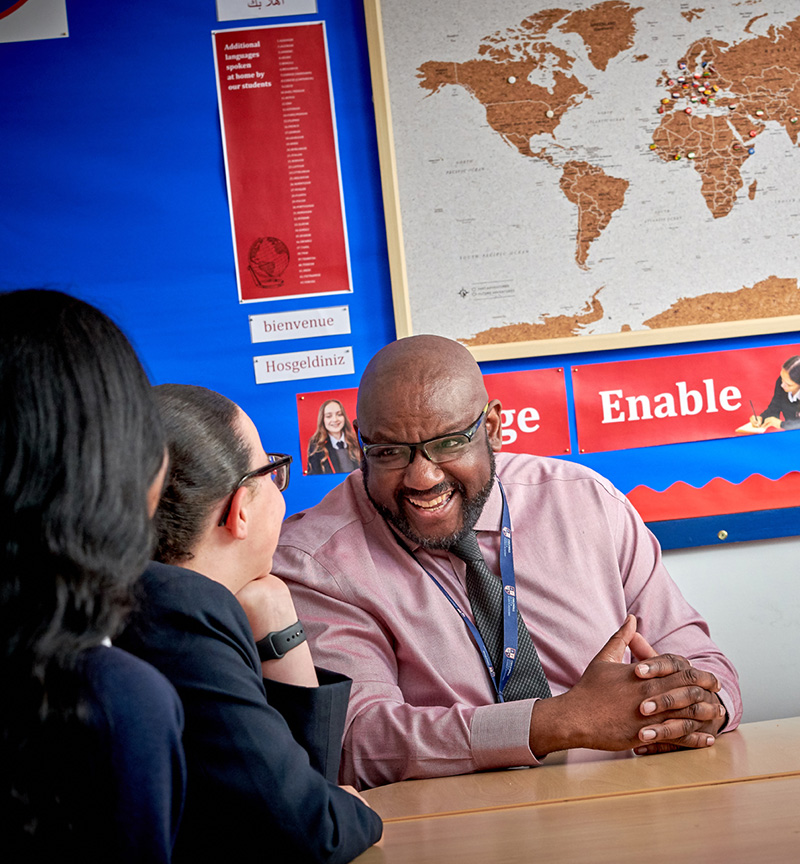Geography
Vision
The Geography Department encourages students to be curious and enthusiastic about the ever-changing world we live in. Students extend their knowledge of human and physical processes that shape the world we live in today by studying a broad range of interesting and stimulating topics.
Curriculum Intent
‘Geography is the subject that holds the key to the future’, Michael Palin
The intent of the geography curriculum at Childwall is to foster an inquisitive and informed understanding of the world amongst our students. We strive to inspire a passion for geographic knowledge, fostering awareness of diverse cultures, environments, and global issues. Our curriculum is designed to enable students to:
• Develop a vigorous understanding of geographical principles and how they affect physical landscapes, human societies, geopolitics and global interconnections.
• Develop critical thinking and analytical skills through the exploration of contemporary issues such as climate change, urbanisation, and social inequality.
• Foster an appreciation for sustainability and environmental awareness, preparing students to engage with and contribute positively to their communities and the world.
• Encourage spatial awareness and the ability to interpret and utilise geographical data through various means, including maps, GIS technologies, and fieldwork.
Through a well-structured and dynamic curriculum, we intend to equip our students with the skills and knowledge necessary to become responsible, informed citizens who can navigate and positively impact an increasingly interconnected world.

Implementation
The implementation of our geography curriculum is characterised by a blend of theoretical knowledge and practical applications, designed to engage students actively and create meaningful learning experiences. Key elements of implementation include:
- Curriculum Design: Our geography curriculum is sequenced coherently across key stages, ensuring progressive development of skills and knowledge. Units are aligned with national standards, incorporating essential themes such as local geography, global dynamics, and environmental challenges.
- Active Learning: We employ a range of teaching strategies to encourage active participation, including collaborative group work, investigative home learning, and the use of technology to enhance geographic understanding. Fieldwork is integrated at all key stages, allowing students to observe and study geographical concepts in real-world contexts.
- Adaptive teaching: Lessons are tailored to meet the diverse needs of all learners. We provide various resources and learning strategies, ensuring that every student can engage with the material meaningfully. Regular formative assessments guide our teaching and inform future planning for individual learning styles.
- Cross-Curricular Links: Our geography curriculum promotes connections with other subjects, such as history, science and mathematics, enriching students’ holistic understanding of geographical concepts. These links also enhance students’ analytical skills, fostering a multidisciplinary approach to problem-solving.
- Literacy approach: Literacy is at the forefront of our curriculum. We have embedded a variety of creative extended writing opportunities through the ‘Big Write’ tasks, for e.g. When completing our fieldwork unit in Year 7 students are tasked with writing an evaluation on their findings. Also, students will routinely be offered opportunities to work in pairs and groups to develop oracy skills. We develop student’s oracy skills through debates, discussions, and presentation of excellence. We encourage students to use a wide range of geographical vocabulary which is appropriate and accurate, and which develops and evolves throughout their journey in Geography.
- Assessment and Feedback: Regular assessments are conducted to monitor progress. Constructive feedback is provided, allowing students to reflect on their learning journey, understand their strengths, and identify areas for improvement.
All lesson/series of lesson will contain the following:
- Effective questioning that promotes discussion
- Engaging tasks to promote deep thinking giving the students opportunities to explain and justify their opinions.
- Some lessons and all assessments give students the skills to structure extended pieces of writing and the stamina to write for longer.
Classroom practices – In classrooms, there are many systems in place to support us in achieving our aims.
- All lessons will start with a ‘do now’ activity to promote discussion and geographical thinking
- All lesson intentions are constructed using higher order blooms taxonomy
- The majority of lessons will embed retrieval practice to activate prior knowledge that will be needed to access the lesson.
- Lessons encourage students to make synoptic links to develop their understanding of the topics and how they are interconnected, providing the bigger picture.
- Some lessons will provide the opportunity to participate in practical based learning activities, for example; model making or river drainage basins, coastal landforms, earthquake proof building designs, plate boundaries, and landscapes in a box.
- Where appropriate pictorial and video resources are used to support the learning
Problem solving tasks are carefully constructed to include links with other concepts from the geography curriculum
Curriculum Overview
Learning Journey
Be Ambitious
Ambitious activities are those that take your regular curriculum further. They take the subjects you study in the classroom beyond that which your teacher has taught you or what you’ve done for home learning. For example, you may go into more depth on something you picked up in the classroom or learn about a new topic altogether. These activities are normally in the form of extra reading, but they can take many other forms, like watching videos online, downloading podcasts, attending lectures, visiting museums or entering academic competitions.
In the future, employers or universities will be interested to hear about what ambitious activities you have engaged in; they will be interested in what you have learnt and impressed by your efforts. Click here for further details




